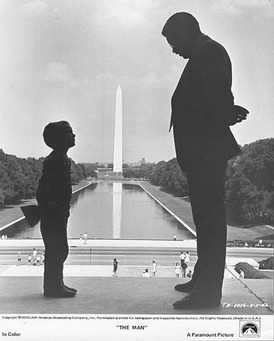In the early 1960s, Irving Wallace began writing his novel The Man, which placed a black man as the President of the United States long before former President Obama even imagined himself in politics. The novel sold exceedingly well staying at the number one spot on the New York Times bestseller list for months on end.
Many interested parties, including Sammy Davis Jr., considered purchasing film rights to the novel. Ultimately Paramount Pictures made the motion picture starring James Earl Jones as “The Man” and several other stellar actors as his supporting cast.

How did Irving Wallace manage a convincing presidential character as his main protagonist? Well, nine weeks before John F. Kennedy was assassinated, Wallace was able to spend time in the White House working with Kennedy in order to research his novel. JFK was a major influence on Wallace while writing the novel, but so were other figures in history. The cover page Wallace wrote to one of his early manuscript drafts includes the following epithet:
One of the author’s prized possessions is an original autographed manuscript, written firmly with pen on cheap ruled paper, signed by a former Negro slave who became a great reformer, lecturer, writer, adviser to Abraham Lincoln, United States Minister to Haiti, and candidate for Vice-President of the United States on the Equal Rights Party in 1872. The manuscript reads as follows:
“In a composite Nation like ours, made up of almost every variety of the human family, there should be, as before the Law, no rich, no poor, no high, no low, no black, no white, but one country, one citizenship, equal rights and a common destiny for all.
“A Government that cannot or does not protect the humblest citizen in his right to life, Liberty and the pursuit of happiness, should be reformed or overthrown, without delay.
Frederick Douglass
“Washington D.C. Oct. 20. 1883”